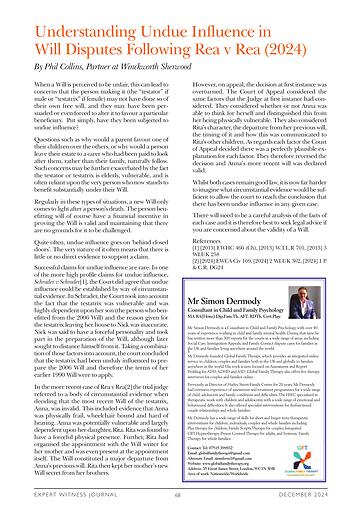Expert Witness Journal Dec 24 - Journal - Page 70

Understanding Undue Influence in
Will Disputes Following Rea v Rea (2024)
By Phil Collins, Partner at Winckworth Sherwood
When a Will is perceived to be unfair, this can lead to
concerns that the person making it (the “testator” if
male or “testatrix” if female) may not have done so of
their own free will, and they may have been persuaded or even forced to alter it to favour a particular
beneficiary. Put simply, have they been subjected to
undue influence?
However, on appeal, the decision at first instance was
overturned. The Court of Appeal considered the
same factors that the Judge at first instance had considered. They considered whether or not Anna was
able to think for herself and distinguished this from
her being physically vulnerable. They also considered
Rita’s character, the departure from her previous will,
the timing of it and how this was communicated to
Rita’s other children. As regards each factor the Court
of Appeal decided there was a perfectly plausible explanation for each factor. They therefore reversed the
decision and Anna’s more recent will was declared
valid.
Questions such as why would a parent favour one of
their children over the others, or why would a person
leave their estate to a carer who had been paid to look
after them, rather than their family, naturally follow.
Such concerns may be further exacerbated by the fact
the testator or testatrix is elderly, vulnerable, and is
often reliant upon the very person who now stands to
benefit substantially under their Will.
Whilst both cases remain good law, it is now far harder
to imagine what circumstantial evidence would be sufficient to allow the court to reach the conclusion that
there has been undue influence in any given case.
Regularly in these types of situations, a new Will only
comes to light after a person’s death. The person benefitting will of course have a financial incentive in
proving the Will is valid and maintaining that there
are no grounds for it to be challenged.
There will need to be a careful analysis of the facts of
each case and it is therefore best to seek legal advice if
you are concerned about the validity of a Will.
References
Quite often, undue influence goes on ‘behind closed
doors’. The very nature of it often means that there is
little or no direct evidence to support a claim.
[1] [2013] EWHC 466 (Ch), [2013] W.T.L.R 701, [2013] 3
WLUK 258
[2] [2024] EWCA Civ 169, [2024] 2 WLUK 362, [2024] 1 P.
& C.R. DG24
Successful claims for undue influence are rare. In one
of the more high profile claims for undue influence,
Schrader v Schrader[1], the Court did agree that undue
influence could be established by way of circumstantial evidence. In Schrader, the Court took into account
the fact that the testatrix was vulnerable and was
highly dependent upon her son (the person who benefitted from the 2006 Will) and the reason given for
the testatrix leaving her house to Nick was inaccurate.
Nick was said to have a forceful personality and took
part in the preparation of the Will, although later
sought to distance himself from it. Taking a combination of those factors into account, the court concluded
that the testatrix had been unduly influenced to prepare the 2006 Will and therefore the terms of her
earlier 1990 Will were to apply.
Mr Simon Dermody
Consultant in Child and Family Psychology
MA BA(Hons) Dip.Fam.Th. AFT. RDTh. Cert.Play.
Mr Simon Dermody is a Consultant in Child and Family Psychology, with over 40
years of experience working in child and family mental health. During that time he
has written more than 300 reports for the courts in a wide range of areas: including
Social Care, Immigration Appeals, and Family Contact dispute cases for families in
the UK and families living anywhere around the world.
§
Mr Dermody founded Global Family Therapy, which provides an integrated online
service to children, couples and families both in the UK and globally to families
anywhere in the world. His work is now focused on Assessment and Report
Profiling for ADD, ADHD and ASD. Global Family Therapy also offers live therapy
interviews for couples and families online.
Previously as Director of Harley Street Family Centre for 20 years, Mr Dermody
had extensive experience of assessment and treatment programmes for a wide range
of child, adolescent and family conditions and difficulties. The HSFC specialised in
therapeutic work with children and adolescents with a wide range of emotional and
behavioural difficulties. It also offered specialist interventions for dysfunctional
couple relationships and whole families.
In the more recent case of Rea v Rea[2] the trial judge
referred to a body of circumstantial evidence when
deciding that the most recent Will of the testatrix,
Anna, was invalid. This included evidence that Anna
was physically frail, wheelchair bound and hard of
hearing. Anna was potentially vulnerable and largely
dependent upon her daughter, Rita. Rita was found to
have a forceful physical presence. Further, Rita had
organised the appointment with the Will writer for
her mother and was even present at the appointment
itself. The Will constituted a major departure from
Anna’s previous will. Rita then kept her mother’s new
Will secret from her brothers.
EXPERT WITNESS JOURNAL
Mr Dermody has a wide range of skills for short and longer term therapeutic
interventions for children, individuals, couples and whole families including:
Play therapy for children, Family Scripts Therapy for couples, Integrated
CBT-Hypnotherapy-Person Centred Therapy for adults, and Systemic Family
Therapy for whole families.
Contact: Tel: 07515 399932
Email: globalfamilytherapy@gmail.com
Alternate Email: simsderm1@gmail.com
Website: www.globalfamilytherapy.org
Address: 35 Great James Street, London, WC1N 3HB
Area of work: Nationwide/Worldwide
68
DECEMBER 2024












